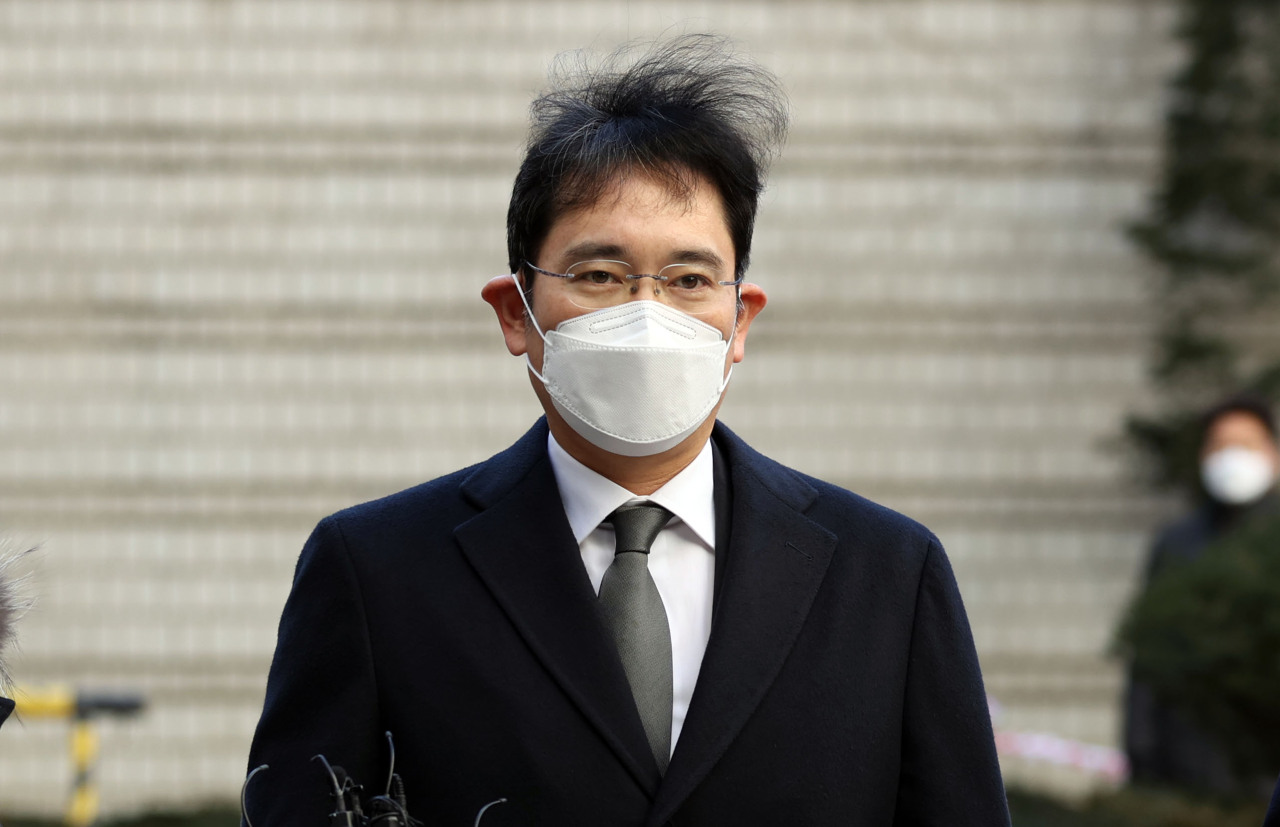Samsung Electronics chief Lee Jae-yong on Thursday denied all charges leveled against him during his first trial hearing on alleged irregularities surrounding his ascension to the helm of Samsung Group.
Attending the session held at the Seoul Central District Court, Lee pleaded not guilty when he was asked by the presiding judge to respond to the charges brought against him by prosecutors which include stock market manipulation, illicit trading and breach of trust.
“I cannot admit (to the indictment). I deny (all the charges),” Lee replied, after a short pause.
It was his first public appearance in 94 days, since he was put behind bars on Jan. 18 for a separate conviction of bribing former President Park Geun-hye.
The first hearing was initially set for March 25 but was postponed to Thursday as Lee underwent emergency surgery for appendicitis last month. The jailed son of the late Samsung Group Chairman Lee Kun-hee had a partial colon resection as his acute appendicitis was diagnosed too late and resulted in complications.
At court, he looked thinner than before. Local media reported that he had lost about 7 kilograms post-surgery.
The trial was held amid growing calls for leniency on the tycoon. Some business tycoons have called for a special pardon, saying Lee’s return to the helm of Samsung Electronics is in the best interest of the country, as the country’s No. 1 position in the global semiconductor market faces serious threats.
Due to Lee’s absence, Samsung has been held back from making timely investments to expand chip manufacturing facilities in Korea and in the United States, those in favor of his leniency say.
While US and Taiwanese rivals Intel, Micron Technology and TSMC have announced aggressive investment plans to increase manufacturing chips, Samsung has remained silent.
Lee could not attend a White House meeting on chips held on April 12, where US President Joe Biden proclaimed the US’ will to rebuild its chip industry in front of heads of major chipmakers. Choi Si-young, president of Samsung’s foundry business, attended on Lee’s behalf.
Thursday’s session set the tone for another legal fight between Samsung lawyers and state prosecutors over the alleged illegality of the process, known as Project G, in which the junior Lee inherited managerial control over the conglomerate from his late father.
Spanning from 2012 through 2016, it involved a series of equity transactions and steps which prosecutors said were planned to make it easier for Lee to gain control of the company.
They include the 2015 merger between Samsung C&T, the de facto holding company, and Cheil Industries, a textile and electronic chemical materials producer, and the alleged accounting fraud at Samsung Biologics.
Prosecutors have indicted Lee and 10 other Samsung officials for that.
During Thursday’s trial, prosecutors emphasized that the indictment does not simply accuse Lee of using the merger for the personal purpose of leadership succession.
“The more important fact is that during the process of the merger, there were several illegal practices that violated the capital market law, such as releasing false information about the effect of the merger, concealing related facts from C&T shareholders and investors and incurring losses to them,” one of the prosecutor’s said.
“Lee and officials at the (now-defunct) Future Strategy Office did order the merger at an unfair merger ratio at a designated timing at the interest of Lee,” the prosecutor said.
In response, Samsung’s lawyers argued the two incidents took place for business purposes only, and had no correlation at all.
Samsung stressed the merger was legitimate and evaluated positively by foreign investors and advisory firms in that it played a key role in stabilizing Samsung Group’s overall management and eliminating the complex cross-shareholding structure.
Specifically, the merger was proposed by former Cheil Industries CEO Yoon Ju-hwa in April 2015 as a measure to overcome management difficulties at C&T at the time. The construction unit of C&T suffered massive losses from its overseas infrastructure projects, and had to lay off its workforce. After the merger, C&T’s credit rating went up by two notches based on improved profits and decreased debt, Samsung’s representatives said.
“It is not true that Lee became the largest shareholder of C&T without paying any price,” one lawyer said. “Lee instead gave up a big portion of his stake in Cheil.”
Regarding the accusation on manipulating the merger ratio, the lawyer said, “The ratio was set based on stock prices at the time.”
Samsung lawyers also asserted the prosecutors had ignored other purposes of the merger other than Lee’s leadership succession.
“The civilian panel formed by the prosecutors last year opposed the indictment, but they sought the indictment based on confirmation bias,“ another Samsung lawyer claimed.
By Song Su-hyun (
song@heraldcorp.com)




![[Herald Interview] 'Trump will use tariffs as first line of defense for American manufacturing'](http://res.heraldm.com/phpwas/restmb_idxmake.php?idx=644&simg=/content/image/2024/11/26/20241126050017_0.jpg)

![[Health and care] Getting cancer young: Why cancer isn’t just an older person’s battle](http://res.heraldm.com/phpwas/restmb_idxmake.php?idx=644&simg=/content/image/2024/11/26/20241126050043_0.jpg)

![[Graphic News] International marriages on rise in Korea](http://res.heraldm.com/phpwas/restmb_idxmake.php?idx=644&simg=/content/image/2024/11/25/20241125050091_0.gif)